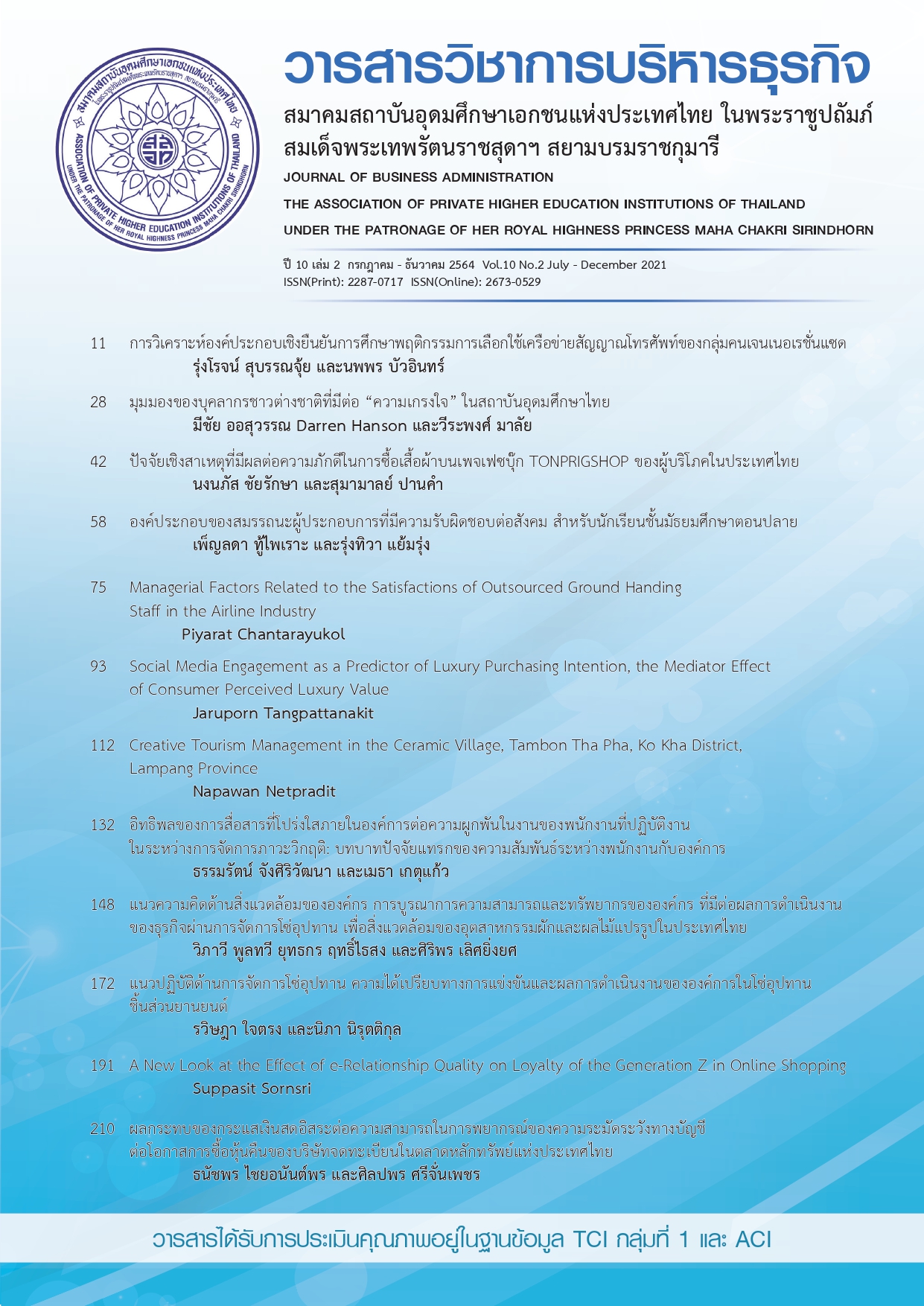แนวปฏิบัติด้านการจัดการโซ่อุปทาน ความได้เปรียบทางการแข่งขันและผลการดำเนินงานขององค์การในโซ่อุปทานชิ้นส่วนยานยนต์
คำสำคัญ:
แนวปฏิบัติด้านการจัดการโซ่อุปทาน, ความได้เปรียบทางการแข่งขัน, ผลการดำเนินงานขององค์การ, ชิ้นส่วนยานยนต์บทคัดย่อ
งานวิจัยชิ้นนี้มีวัตถุประสงค์เพื่อ1. ศึกษาอิทธิพลของแนวปฏิบัติด้านการจัดการโซ่อุปทานต่อความได้เปรียบทางการแข่งขัน และ 2. ศึกษาผลการดำเนินงานขององค์การในโซ่อุปทานชิ้นส่วนยานยนต์ เพื่อเป็นแนวทางให้กับผู้ผลิตชิ้นส่วนยานยนต์ในการสร้างความได้เปรียบทางการแข่งขันขององค์การ งานวิจัยนี้เป็นงานวิจัยเชิงปริมาณที่เก็บรวบรวมข้อมูลโดยใช้แบบสอบถาม ด้วยวิธีการสุ่มตัวอย่างแบบชั้นภูมิจากผู้บริหารระดับต้นและผู้บริหารระดับกลางของผู้ผลิตชิ้นส่วนยานยนต์ลำดับแรก(Tier 1) ในอุตสาหกรรมการผลิตชิ้นส่วนยานยนต์ในประเทศไทยจำนวน 321 บริษัท วิเคราะห์ข้อมูลงานวิจัยด้วยโมเดลสมการโครงสร้างเพื่อทดสอบสมมุติฐาน
ผลการวิจัยพบว่าแบบจำลองสมการโครงสร้างที่พัฒนาขึ้นของแนวปฏิบัติด้านการจัดการโซ่อุปทาน ความได้เปรียบทางการแข่งขันและผลการดำเนินงานขององค์การมีความสอดคล้องกับข้อมูลเชิงประจักษ์โดยมีค่า CMIN/df = 2.481, AGFI =0.892, RFI = 0.925, IFI =0.963, CFI =0.963 และ RMSEA =0.068 โดยระดับของแนวปฏิบัติด้านการจัดการโซ่อุปทานมีอิทธิพลต่อความได้เปรียบทางการแข่งขันอย่างมีนัยสำคัญทางสถิติที่ 0.001 และความได้เปรียบทางการแข่งขันมีอิทธิพลต่อผลการดำเนินงานขององค์การผู้ผลิตชิ้นส่วนยานยนต์ลำดับแรกอย่างมีนัยสำคัญทางสถิติที่ 0.001 และมีค่าสัมประสิทธิ์เส้นทางที่ 0.857 และ 0.685 ตามลำดับ ผลการศึกษานี้สามารถช่วยให้ผู้ประกอบการใช้เป็นแนวทางในการวางแผนกลยุทธ์ขององค์การ เพื่อสร้างความสามารถในการแข่งขันและผลักดันผลการดำเนินงานที่มีประสิทธิภาพด้านการจัดการโซ่อุปทาน
เอกสารอ้างอิง
Baumgartner, H., & Homburg, C. (1996). Applications of structural equation modeling in marketing and consumer research: A review. International Journal of Research in Marketing, 13(2), 139-161.
Brulhart, F., Okongwu, U., & Moncef, B. (2016). Causal Linkages between Supply Chain Management Practices and Performance a Balanced Scorecard Strategy Map Perspective. Journal of Manufacturing Technology Management, 26(5), 678-702.
Chopra, S., & Meindl, P. (2016). Supply Chain Management : Strategy, Planning, and Operation (6th ed.). United Kingdom: Pearson Education.
Council of Supply Chain Management Professionals. (2020, August 2013). Supply Chain Management Terms and Glossary. Retrieved from https://cscmp.org/CSCMP/Academia/SCM_Definitions_and_Glossary_of_Terms/CSCMP/Educate/SCM_Definitions_and_Glossary_of_Terms.aspx?hkey=60879588-f65f-4ab5-8c4b-6878815ef921
Daft, R. L. (2018). Management (13th ed.). Singapore: Cengage Learning, Inc.
Finstad, K. (2010). Response Interpolation and Scale Sensitivity: Evidence Against 5-Point Scales. Journal of Usability Studies, 5(3), 104-110.
Gharakhani, D. (2012). Impact of Supply Chain Management Practices on Innovation and Organizational Performance in Iranian Companies. African Journal of Business Management, 6(19), 5939-5949.
GSB Research. (2020). Industry Update. Retrieved from https://www.gsbresearch.or.th/gsb/published-works/7918/
Hair, J. F., Black, W. C., Babin, B. J., & Anderson, R. E. (2014). Multivariate Data Analysis (7th ed.). Upper Saddle River, NJ: Pearson Education Limited.
Handoko, B. L., Aryanto, R., & So, I. G. (2015). The Impact of Enterprise Resources System and Supply Chain Practices on Competitive Advantage and Firm Performance: Case of Indonesian Companies. Procedia Computer Science, 72, 122-128.
Harmon, P. (2019). Business Process Change: A Business Process Management Guide for Managers and Process Professionals (4th ed.). Boston: Morgan Kaufmann.
Hu, L., & Bentler, P. M. (1999). Cutoff criteria for fit indexes in covariance structure analysis: Conventional criteria versus new alternatives. Structural Equation Modeling: A Multidisciplinary Journal, 6(1), 1-55.
Ince, H., Imamoglu, S. Z., Keskin, H., Akgun, A., & Efe, M. N. (2013). The Impact of ERP Systems and Supply Chain Management Practices on Firm Performance: Case of Turkish Companies. Procedia - Social and Behavioral Sciences, 99, 1124-1133.
Jamal, N. M. (2011). Management Accounting and The Implications of Supply Chain Management Practices an Empirical Study (Doctor dissertation). Lancaster State: Lancaster University.
Khalil, M. K., Khalil, R., & Khan, S. N. (2019). A Study on the Effect of Supply Chain Management Practices on Organizational Performance with the Mediating Role of Innovation in SMEs. Uncertain Supply Chain Management, 7(2), 179-190.
Kline, R. B. (2005). Principles and Practice of Structural Equation Modeling (2nd ed.). NY: Guilford Publications.
Koufteros, X. A., Vonderembse, M. A., & Doll, W. J. (2002). Examining the Competitive Capabilities of Manufacturing Firms. Structural Equation Modeling: A Multidisciplinary Journal, 9(2), 256-282.
Li, S., Ragu-Nathan, B., Ragu-Nathan, T. S., & Subba Rao, S. (2006). The Impact of Supply Chain Management Practices on Competitive Advantage and Organizational Performance. Omega, 34(2), 107-124.
Mirabi, M., Hatami, A. S., & Karamad, S. (2018). Impact of Supply Chain Management and Agile Supply Chain on Customer Satisfaction and Competitive Advantage. International Journal of Engineering and Technology, 10(4), 995-1004.
Mutuerandu, M. N. (2014). Impact of Supply Chain Management Practices on Organizational Performance A Case Study of Haco Industries Limited (Kenya). IOSR Journal of Business and Management, 16(4), 62-64.
Office of the National Economic & Social Development Council. (2021). NESDC ECONOMIC REPORT. Retrieved from https://www.nesdc.go.th/ewt_dl_link.php?nid=11262
Pommi, C. (2015). A Structural Equation Modeling of Environmental Uncertainty, Partner Relationship, Supply Chain Management Practices and Competitive Advantage. (Master degree). Bangkok: Kasetsart University.
Porter, M. E. (1985). Competitive Advantage: Creating and Sustaining Superior Peifonnance. NY: The Free Press.
Quynh, D. V. X., & Huy, N. H. (2018). Supply Chain Management Practices, Competitive Advantages and Firm Performance: A Case of Small and Medium Enterprises (SMEs) in Vietnam. Journal of Modern Accounting and Auditing, 14(3), 136-146.
Sukati, I., Hamid, A. B. A., Baharun, R., & Tat, H. H. (2011). A Study of Supply Chain Management Practices an Empirical Investigation on Consumer Goods Industry in Malaysia. International Journal of Business and Social Science, 2(17), 166-176.
Thatte, A. A. (2007). Competitive Advantage of a Firm through Supply Chain Responsiveness and SCM Practices (Doctor dissertation). OH: The University of Toledo.
Thatte, A. A., Agrawal, V., & Muhammed, S. (2009). Linking Information Sharing And Supplier Network Responsiveness With Delivery Dependability Of A Firm. The Journal of Applied Business Research, 9, 37-56.
Tongchim, P. (2013). Relationship of Supply Chain Management and Performance Measurement in Rubber Supply Chains. (Master degree). Bangkok: Kasetsart University.
Vanichbuncha, K. (2019). Structural Equation Modeling:SEM with AMOS. Bangkok: Chulabook.
Vanichchinchai, A., & Igel, B. (2011). The impact of total quality management on supply chain management and firm's supply performance. International Journal of Production Research, 49(11), 3405-3424.

ดาวน์โหลด
เผยแพร่แล้ว
รูปแบบการอ้างอิง
ฉบับ
ประเภทบทความ
สัญญาอนุญาต
บทความที่ลงตีพิมพ์ในวารสารวิชาการบริหารธุรกิจ สมาคมสถาบันอุดมศึกษาเอกชนแห่งประเทศไทยต้องเป็นบทความที่ไม่เคยได้รับการตีพิมพ์เผยแพร่ หรืออยู่ระหว่างการพิจารณาตีพิมพ์ในวารสารอื่นๆ การละเมิดลิขสิทธิ์เป็นความรับผิดชอบของผู้ส่งบทความโดยตรง

